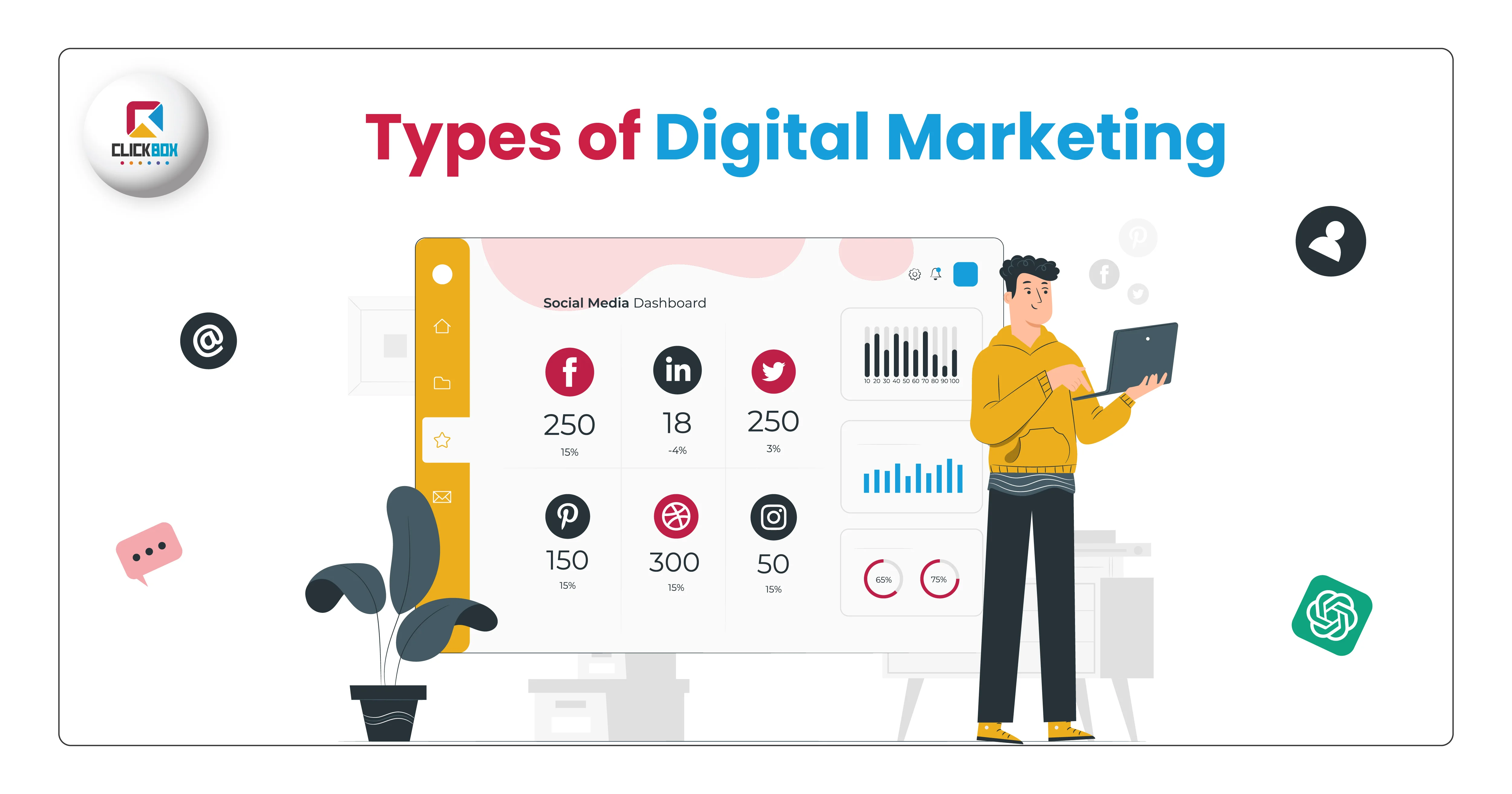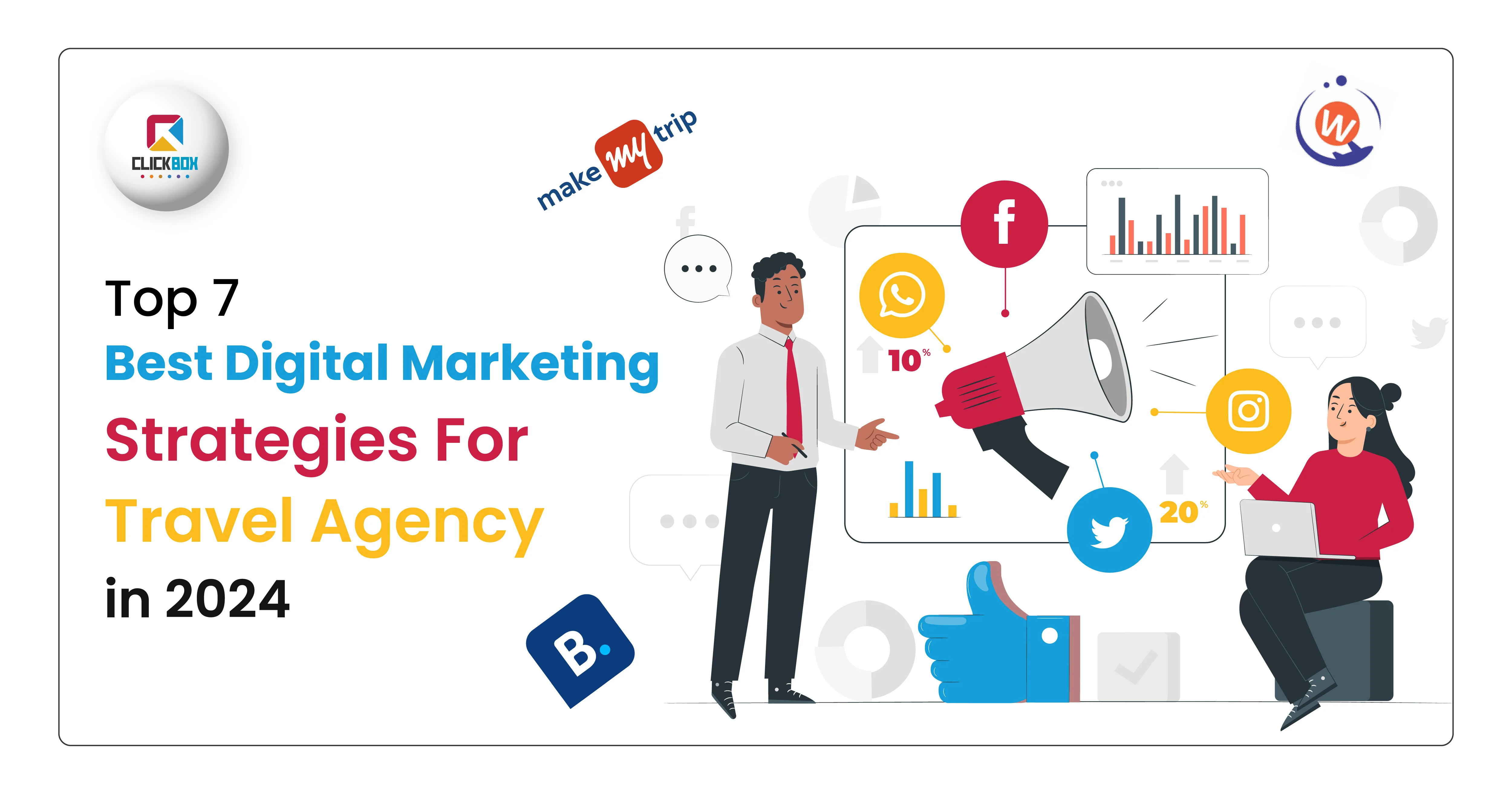Top 7 Best Digital Marketing Strategies For Travel Agency 2024
Creating effective digital marketing strategies for a travel agency requires a combination of creativity, technological savvy, and a deep understanding of your target audience. In the highly competitive travel industry, implementing effective digital marketing strategies is essential for a travel agency to stand out, attract prospective travelers, and drive bookings. A successful digital marketing plan for a travel agency typically involves optimizing online channels to engage, inform, and inspire potential customers. Before that we must know what is Digital Marketing exactly? Come on guys, let's discuss it…
What is Digital Marketing?
Digital marketing refers to the usage of digital courses, stages, and technologies to upgrade works, favors, or trademarks to a prey followership. It encompasses a wide range of online marketing activities designed to connect businesses with their customers through digital means. Digital marketing leverages various tools and techniques to reach and engage audiences across the internet, including social media, search engines, email, websites, and other digital platforms.
Types of digital marketing

Digital marketing encompasses a diverse set of strategies and channels, offering businesses the tools to connect with their audience in a personalized, measurable, and cost-effective way. As technology continues to evolve, so too will the landscape of digital marketing, making it an ever-adapting and critical aspect of modern business strategies.
Digital marketing is a multifaceted approach that utilizes the power of the internet and digital technologies to create a meaningful online presence, connect with target audiences, and achieve business objectives in a rapidly evolving digital landscape. It requires a strategic, data-driven, and customer-centric approach to effectively navigate the complexities of the digital marketing ecosystem.
Why is Digital Marketing Important For Travel Agencies?
Digital marketing is crucial for travel agencies due to the transformative impact it has on the industry and the unique challenges and opportunities it presents. Here are several reasons why digital marketing is especially important for travel agencies:
1. Online Presence and Visibility
Travelers overwhelmingly turn to the internet to research and plan their trips. Digital marketing ensures that a travel agency has a strong online presence, making it easily discoverable by potential customers. Establishing a strong online presence and visibility is a critical aspect of digital marketing for a travel agency. The online landscape is where potential travelers conduct research, seek inspiration, and ma
2.Global Reach
Digital marketing allows travel agencies to reach a global audience. Through online channels, agencies can showcase their services and destinations to people around the world, expanding their market reach beyond geographical limitations. Expanding the global reach of a travel agency through digital marketing involves strategic planning, targeted efforts, and leveraging various online channels. With the help of Digital marketing we can reach more customers globally. As of 2022, platforms like Facebook, Instagram, Twitter, LinkedIn, and Pinterest have billions of active users collectively.
3. Targeted Advertising
Targeted advertising is a crucial component of digital marketing for a travel agency, helping to reach the right audience with personalized messages. Digital marketing precise targeting based on demographics, interests, online behavior, and other criteria. This ensures that promotional efforts are directed at the most relevant audience, increasing the likelihood of attracting potential travelers. This is to run ads for targeted audiences.
4. Engagement through Social Media
Social media platforms are integral for travel inspiration and planning. Digital marketing on platforms like Instagram, Facebook, and Pinterest allows travel agencies to engage with potential customers, share visually appealing content, and build a community around their brand. Engaging with your audience through social media marketing is crucial for a travel agency to build brand awareness, foster community, and inspire travelers.
We can easily connect & engage with customers through social media platforms like facebook, instagram, linkedin, twitter. As of 2022, 80% of the world population were using platforms like Facebook, Instagram, Twitter, LinkedIn, TikTok, and others collectively for digital marketing for travel services .
5.Influencer Collaborations
Travel influencers and bloggers play a significant role in inspiring and influencing travel decisions. Digital marketing facilitates collaborations with influencers, allowing travel agencies to tap into their engaged audiences and leverage authentic recommendations. Collaborating with influencers in the travel industry can be a powerful digital marketing strategy for a travel agency. Influencers have the ability to reach a large and engaged audience, providing authentic and relatable content that can inspire and influence travel decisions.
6. Real-Time Updates and Communication
Digital platforms provide a means for travel agencies to deliver real-time updates on promotions, offers, and travel advisories. Instant communication through email, social media, and website updates helps agencies stay connected with their audience. Real-time updates and communication are crucial aspects of digital marketing for a travel agency. Keeping your audience informed and engaged in real-time helps build trust, fosters customer loyalty, and enhances the overall customer experience. A significant percentage of users expect brands to respond to their social media messages within hours. According to various studies, about 70% of users expect a response within 15 minutes on social media.
7. Personalized Marketing
Personalized marketing is a powerful strategy for a travel agency as it allows you to tailor your messages, promotions, and recommendations to individual preferences, creating a more engaging and relevant experience for your customers. Digital marketing allows travel agencies to collect and analyze customer data. This information can be used to personalize marketing messages, recommend tailored travel experiences, and create targeted promotions, enhancing the overall customer experience.
8. Cost-Effective Advertising
Compared to traditional advertising methods, digital marketing often offers cost-effective solutions. Pay-Per-Click (PPC) campaigns, social media advertising, and email marketing can be tailored to fit various budgets while providing measurable results. Cost-effective advertising is essential for maximizing the impact of digital marketing campaigns for a travel agency, especially when working with various budget constraints.
9. Analytics and Data-Driven Insights
Analytics and data-driven insights play a crucial role in the success of digital marketing for a travel agency. By leveraging data, you can gain valuable insights into the effectiveness of your campaigns, understand customer behavior, and make informed decisions to optimize your marketing strategies. Digital marketing tools provide detailed analytics and insights into campaign performance. Travel agencies can track website traffic, user behavior, and the effectiveness of marketing efforts, allowing for data-driven decision-making and continuous improvement.
10. 24/7 Availability and Booking
Digital platforms enable travel agencies to be accessible around the clock. Potential customers can explore offerings, gather information, and even make bookings at their convenience, contributing to increased sales opportunities. According to a study by HubSpot, 82% of customers expect an immediate response from brands, especially when they have a question or need assistance.
A survey by Statista found that 64% of respondents prefer to book appointments online, emphasizing the growing preference for digital booking methods.
Websites with 24/7 availability and online booking capabilities tend to have higher conversion rates. A study by SuperOffice found that businesses that respond to leads within five minutes are 21 times more likely to qualify the lead than those who respond in 30 minutes.
With the increasing use of smartphones, mobile devices play a significant role in online bookings. Google reports that 61% of users are unlikely to return to a mobile site they had trouble accessing, underscoring the importance of mobile optimization for booking processes.
Social media platforms are increasingly becoming channels for customer engagement and bookings. According to Facebook, over 60% of users on their platform discover new products and services there, emphasizing the potential for social media-driven bookings. In the travel and hospitality sector, online bookings have become the norm. According to a report by Statista, online travel bookings are expected to reach over 800 billion U.S. dollars by 2023.
In the retail sector, offering 24/7 availability and online booking options can significantly impact sales. A study by Salesforce found that 64% of consumers expect companies to respond and interact with them in real-time.
Providing 24/7 availability and online booking options contributes to improved customer satisfaction. A study by TOA Technologies found that 87% of customers who book services online are satisfied with the experience. Ex: Redbus is essential for online booking with cheap & best service - 24/7 anytime and anywhere with their convenience.
11. Adaptation to Industry Trends
The travel industry evolves rapidly, and digital marketing allows agencies to adapt to changing trends seamlessly. Whether it's the rise of new social media platforms, changes in search engine algorithms, or emerging technologies, digital marketing helps agencies stay relevant. For today’s technology savvy, We need to adapt according to industry trends. This digital marketing made us adapt to industry trends globally. According to a survey by Salesforce, 62% consumers expect companies to adapt their technology based on new trends and innovations.
Google reports that 57% of users say they won't recommend a business with a poorly designed mobile site. Mobile optimization is essential as an increasing number of users access digital content through mobile devices. Cisco predicts that by 2022, online videos will make up more than 82% of all consumer internet traffic. Businesses adapting to this trend by incorporating video content in their digital marketing strategies can benefit from increased engagement.
Gartner predicts that by 2021, 15% of all customer service interactions will be handled completely by AI, an increase from 2% in 2017. Businesses incorporating AI-driven chatbots can enhance customer service and efficiency.
Top 7 Best Digital Marketing Strategies For Travel Agency 2024
1. Build a strong & user-friendly website
Creating an effective & user-friendly website for a travel agency is crucial for a successful digital marketing strategy. A well-designed website not only attracts potential customers but also provides a platform to showcase your services, build credibility, and drive conversions. If we want to mark a place of our own in the digital world, we need to create a website with unique designs that caters to the needs of a variety of clients. This is one of the important steps in digital marketing strategies for travel agencies.
We need to optimize and personalize the website with high quality content, attractive services, beautiful images & page speed etc,.. We need to fill our website with high quality travel-related content.
Here are some steps of the key elements and considerations for building a website for digital marketing in the context of a travel agency: Below listed are guidelines needed to be followed:
-
● User-Friendly Design
-
● Compelling Visuals
-
● Clear Call-to-Action (CTA)
-
● Detailed Destination Information
-
● Booking System Integration
-
● Travel Packages and Promotions
-
● Customer Reviews and Testimonials
-
● Blog and Content Hub
-
● Social Media Integration
-
● Interactive Features
-
● Email Subscription and Newsletters
-
● Security and Trust Elements
-
● Multilingual and Currency Support
-
● Analytics and Conversion Tracking
-
● Contact Information and Support
2. Create a catchy content for content marketing
Content marketing is a powerful strategy for a travel agency, providing means to engage and educate your audience, showcase your expertise, and inspire potential travelers. Content marketing is a crucial component of digital marketing for a travel agency.
It entails producing and disseminating material that is worthwhile, timely, and consistent in order to draw in, hold on to, and attract a target audience. In the context of a travel agency, effective content marketing aims to inspire, educate, and assist potential travelers in their journey decision-making process.
By implementing a comprehensive content marketing strategy, a travel agency can build a strong online presence, foster customer relationships, and drive bookings. The key is to consistently deliver valuable, relevant, and engaging content that meets the needs of your audience throughout their travel journey.Below listed are checklists needed to be followed:
-
● Understand your audience
-
● Create engaging blog content
-
● Visual Storytelling
-
● User-Generated Content (UGC)
-
● Interactive Content
-
● Destination Guides and Itineraries
-
● Email Newsletters
-
● SEO Optimization
-
● Social Media Content Strategy
-
● Tell Customer Stories
-
● Email Subscription and Newsletters
-
● Podcasts and Video Series
-
● Seasonal and Trend-Driven Content
-
● Educational Content
-
● Measure and Analyze Performance
3. Build a strong social media presence for social media marketing
Social media marketing is now a key player in the travel industry. Building a strong social media presence is essential for the digital marketing success of a travel agency. Social media provides a platform to connect with potential travelers, showcase destinations, and promote travel services. First we should create a good professional account on all social media platforms.
Social media platforms like facebook, instagram, linkedin, twitter, pinterest, you-tube - in all of these we should update daily posts anything like image, reels or videos. On posting we receive comments, so at that time we should interact kindly with customers. Consistency, authenticity, and engagement are key factors in building a successful social media presence for your travel agency.
Below listed are steps needed to be followed:
-
● Define Your Social Media Strategy
-
● Choose the Right Platforms
-
● Optimize Profiles
-
● Content Calendar
-
● User-Generated Content (UGC)
-
● Proper Hashtags
-
● Engage with Followers
-
● Engage with Followers
-
● Contests and Giveaways
-
● Collaborate with Tourism Boards and Partners
-
● Promote Special Offers and Packages
-
● Paid Advertising
-
● Analytics and Perfor
4. Build a strong social media presence for social media marketing Search Engine Optimization (SEO)
Search Engine Optimization (SEO) is crucial for a travel agency's digital marketing strategy. Optimizing your website for search engines helps improve its visibility on search engine results pages (SERPs), driving organic traffic and increasing the likelihood of attracting potential travelers. Implementing a comprehensive SEO strategy for your travel agency involves ongoing efforts and adaptation to industry trends.
By optimizing your website and content for search engines, you can enhance your online visibility, attract a targeted audience, and ultimately drive more bookings. Regularly analyze performance metrics and adjust your approach to ensure long-term success in the competitive travel market.
Conduct thorough keyword research to identify terms related to your travel agency's services, destinations, and target audience. Use tools like Google Keyword Planner, SEMrush, or Ahrefs to discover relevant keywords and assess their search volumes.
Optimize title tags and meta descriptions for each page with relevant keywords and compelling, clickable content. Keep titles under 60 characters and meta descriptions under 155 characters.
Create SEO-friendly URLs that are concise and include relevant keywords. Avoid using URLs which are dynamic or complex or that require extra parameters. Compress images to reduce load times. Create high-quality, informative, and engaging content that addresses user queries and provides value.Regularly update content to keep it relevant and showcase your expertise.
Claim and optimize your Google My Business listing. Give accurate contact details, such as your address, phone number, and business hours. Encourage satisfied customers to leave positive reviews on your GMB profile. Optimize your website's loading speed. Use resources like Google PageSpeed Insights to pinpoint areas that require enhancement. Reduce the number of HTTP queries, use browser caching, and compress pictures.
Here's a detailed guide on how to implement SEO for a travel agency:
Below listed are steps needed to be followed:
-
● Keyword Research
-
● On-Page SEO
-
● Content Quality and Relevance
-
● Local SEO
-
● Mobile Optimization
-
● Technical SEO
-
● Backlink Building
-
● Social Signals
-
● User Experience (UX)
-
● Monitoring and Analytics
-
● Customer Reviews and Testimonials
-
● Adapt to Algorithm Changes
5. Email marketing
Email marketing is a powerful tool for a travel agency, providing a direct and personalized way to engage with your audience, promote travel services, and drive bookings. Email marketing is helpful for promotion activities, sending announcements, for sending bulk mails. And to promote E-commerce business, top corporate companies. Mailchimp, constant contact, hubspot, mailerlite are some of the free email marketing tools useful for digital marketing strategy for travel agencies. Here are some effective email marketing strategies tailored for a travel agency:
Below listed are steps needed to be followed:
-
● Build and Segment Your Email List
-
● Welcome Series
-
● Personalized Recommendations
-
● Travel Inspiration and Content
-
● Exclusive Promotions and Offers
-
● Seasonal Campaigns
-
● Abandoned Cart Emails
-
● Customer Loyalty Programs
-
● Event-Based Campaigns
-
● User-generated Content (UGC) Campaigns
-
● Survey and Feedback Emails
-
● Responsive Design and Testing
-
● Transactional Emails
-
● Compliance with Regulations
-
● Automated Drip Campaigns
-
● Analytics and Performance Tracking
-
● Re-Engagement Campaigns
6.Paid Advertising (Google Ads)
Paid advertising is an effective way for a travel agency to reach a targeted audience, increase brand visibility, and drive bookings. Google ads are paid ads which is a crucial component of a comprehensive digital marketing strategy for a travel agency. It involves investing in online advertising platforms to promote travel services, attract potential customers, and drive bookings.
Implementing a well-rounded paid advertising strategy involves a combination of creativity, data analysis, and ongoing optimization. Regularly review your campaigns, adapt to industry trends, and stay informed about changes in advertising platforms to ensure the continued success of your travel agency's paid advertising efforts. Here's a comprehensive guide to developing a paid advertising strategy for a travel agency:
Below listed are steps needed to be followed:
-
● Define Campaign Goals
-
● Know Your Audience
-
● Choose Relevant Platforms
-
● Create Compelling Ad Creative
-
● Utilize Different Ad Formats
-
● Advertise Special Offers and Packages
-
● Leverage Retargeting
-
● Geo-Targeting
-
● Budget Management
-
● Monitor and Optimize
-
● Collaborate with Influencers
-
● Mobile Optimization
-
● Measure ROI and Adjust Strategies
-
● Compliance with Advertising Policies
7.Influencer Collaboration
Collaborating with influencers can be a highly effective strategy for a travel agency to enhance brand visibility, build credibility, and reach a wider audience. By carefully selecting influencers, establishing clear objectives, and fostering authentic collaborations, a travel agency can leverage influencer marketing to create compelling content, build trust, and ultimately drive bookings.
Continuous monitoring, analysis, and adaptation are essential for maximizing the impact of influencer collaborations in the ever-evolving landscape of digital marketing.
Below listed are steps needed to be followed:
-
● Identify the Right Influencers
-
● Establish Clear Goals and Objectives
-
● Understand Your Target Audience
-
● Create Mutually Beneficial Partnerships
-
● Craft Engaging Content Concepts
-
● Promote Exclusive Offers
-
● Utilize Various Social Media Platforms
-
● Effective Communication
-
● Budget Management
-
● Measure and Analyze Performance
-
● Legal and Ethical Considerations
-
● User Engagement
-
● Post-Collaboration Engagement
-
● Adaptation and Learning
Are you in search of an exclusive digital marketing service for a travel agency?
#1 Best digital marketing services for travel agency in coimbatore - “CLICKBOX AGENCY”
We Clickbox agency provides many travel agency based digital marketing services like SEO, Social media marketing and PPC advertising services. And also we develop mobile apps, website development, UI/UX design, logo design,etc…
We Clickbox agency make travel agency based business grow with lead generation, brand awareness, traffic to the website,etc.. Our services are unique and different from other agencies that you would have never experienced before. Our strategies which we use to work in digital marketing are newly updated.
Projects - Digital marketing for travel agency we done
John Click
Digital Marketer | SEO Copywriter | Content Strategist
Experienced digital marketer with a proven track record in creating compelling content that not only engages audiences but also drives conversions and enhances SEO visibility. My expertise extends beyond marketing strategy to crafting persuasive narratives that resonate with your target audience. I combine data-driven strategies with captivating writing to deliver measurable results, ensuring your brand shines in the digital landscape.
John Click
Digital Marketer | SEO Copywriter | Content Strategist
Experienced digital marketer with a proven track record in creating compelling content that not only engages audiences but also drives conversions and enhances SEO visibility. My expertise extends beyond marketing strategy to crafting persuasive narratives that resonate with your target audience. I combine data-driven strategies with captivating writing to deliver measurable results, ensuring your brand shines in the digital landscape.







 Digital Marketing
Digital Marketing


 Digital Marketing
Digital Marketing Digital Marketing
Digital Marketing



